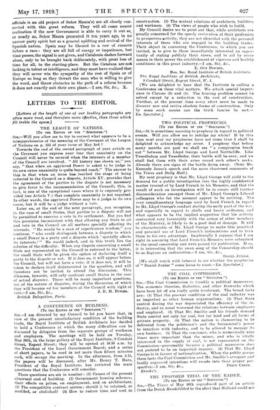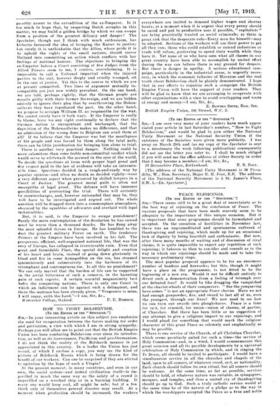THE PROPOSED TRIAL OF THE KAISER.
[To THE EDITOR OF THE " SPECTATOR.") SIE,—The Times of May 10th reproduced part of an article from the Dutch Ifandefsblad to the effect that Holland could not possibly assent to the extradition of the ex-Emperor. Is it too much to hope that, by respecting Dutch scruples in this matter, we may build a golden bridge by which we can escape from a position of the greatest delicacy and danger? The Spectator, though not. I think with much enthusiasm, has litherto favoured the idea of bringing the Kaiser to justice; tut surely it is unthinkable that the Allies, whose pride it is to uphold the rights of the small nations, should coerce Holland into committing an action which conflicts with her feelings of national honour. The objections to bringing the ex-Emperor before a Court consisting of five Judges from the Allied Powers seem to me. I confess, overwhelming. It is impossible to call a Tribunal impartial when the injured parties to the suit, however deeply and cruelly wronged, sit in t he seat of justice. Yet this is the course to which we are at present committed. Two lines of argument mutually in- compatible are just now widely prevalent. On the one hand, we are told, perhaps rightly, that the German people are equally guilty with their former Sovereign, and we are bidden entirely to ignore their plea that by overthrowing the Holten- sollerns they have repudiated the past. On the other hand, we propose to arraign William II. as responsible for the war. We cannot surely huve it both ways. If the Emperor is really to blame, have we any right continually to declare that the Sterman nation is unrepentant and unchanged, that the deposition of the Hobenzollerns makes no difference, and that no admission of the wrong done to Belgium can avail them at all? If we believe that the Emperor was but the mouthpiece of his people and was forced by them along the fatal path. there can be little justification for bringing him alone to trial.
There is another very practical danger. Nothing could be more calamitous than some feeble non-committal verdict which would serve to whitewash the accused in the eyes of the world. IS) decide the questions at issue with proper legal proof and due revert paid to the law of evidence will take an intermin- Mao time. Questions decided in a rough-and-ready way by popular opinion—and often no doubt so decided rightly—wear a very different aspect when presented by skilled lawyers in a Court of Justice. The greatest moral guilt is often not susceptible of legal proof. The defence will have immense possibilities of protracting the trial. There will certainly le countercharges, and, however unfounded they may be, they will have to be investigated and argued out. The whole question will be dragged down into a commonplace atmosphere, obscured by the squabbles of advocates and overlaid with legal technicalities.
But, it is said, is the Emperor to escape punishment? Surely the mere contemplation of the desolation he has caused must be worse than a thousand deaths. He has flung away the most splendid throne in Europe. He has humbled to the dust the greatest military Power on earth. The feudatory Princes of the Empire have been involved in his fall. The prosperous, efficient, well-organized national life, that was the envy of Europe, has collapsed in irretrievable ruin. Even that great and formidable Fleet, the special delight and creation af Isis heart and brain, instead of going down gloriously in Mood and fire in some Armageddon on the sea, has steamed ignominiously and submissively into the harbours of its triumphant and contemptuous foe. Is all this no punishment? We can only marvel that the burden of life can be supported in the awful bitterness of such a remorse, in the haunting pain of such regrets. A certain scornful magnanimity best befits the conquering nations. There is only one Court in which an indictment can lie against such a delinquent, and there the sentence has been already given. "Vengeance is mine, I will repay, saith the Lord."—I sun, Sir, Sc.,



































 Previous page
Previous page